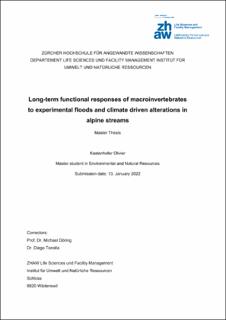Please use this identifier to cite or link to this item:
https://doi.org/10.21256/zhaw-25203Full metadata record
| DC Field | Value | Language |
|---|---|---|
| dc.contributor.advisor | Döring, Michael | - |
| dc.contributor.advisor | Tonolla, Diego | - |
| dc.contributor.author | Kastenhofer, Olivier | - |
| dc.date.accessioned | 2022-06-30T14:02:50Z | - |
| dc.date.available | 2022-06-30T14:02:50Z | - |
| dc.date.issued | 2022 | - |
| dc.identifier.uri | https://digitalcollection.zhaw.ch/handle/11475/25203 | - |
| dc.description.abstract | Hydropower production is negatively affecting stream ecosystems in several Alpine catchments. Dams are among the greatest sources of hydropower-related environmental change in the area, altering the natural flow and sediment regime and releasing stable flows. Adaptive dam management aims at mitigating flow-related alterations, implementing ecologically sound water releases (environmental flows). In alpine rivers, seasonal spates play a fundamental role for stream and riparian ecosystems, sustaining important ecological processes. In regulated rivers, these seasonal high flows are lost after regulation but can be reintroduced by releasing experimental floods (i.e. controlled high-flows from dams). Alpine streams are also undergoing climate-driven environmental changes, which may alter water physico-chemical conditions by changing the contribution of different water sources (icemelt / snowmelt / groundwater), affecting also sediment dynamics and consequently habitat conditions for aquatic organisms. Understanding how climate change affects aquatic ecosystems is crucial to predicting future ecological responses. Further, knowledge on the response to flow restoration enables the development of environmental flow science based on empirical evidence. Here, using functional approaches, macroinvertebrate and environmental data collected during the monitoring of a 17-year experimental flood program on an alpine river, and of two unregulated reference streams with different glacial legacies, belonging to the same catchment (river Spöl) was analyzed. Fuzzy correspondence analysis, functional diversity indices and individual trait patterns were used to detect functional adaptions of the macroinvertebrate community to the experimental flood program, expecting a convergence towards reference streams. Furthermore, it was expected to find indications of climate-driven environmental alterations, and a consequent functional community shift mediated by different glacial signatures. The macroinvertebrate community in the flow-regulated river adapted to the new flow regime (experimental floods), showing multiple functional shifts following an increase in the frequency of traits linked to resistance/resilience. Although the macroinvertebrate community became more similar to the reference streams in terms of functional structure, functional indices and individual traits frequencies, the experimental flood program did not result in a complete ecological restoration. In the reference streams, gradual increases in water temperature and periphyton biomass (climate-driven) were observed. The functional response of macroinvertebrate communities differed between streams, highlighting the relevancy of glacial fingerprints in determining the magnitude and speed of such response. This study confirms the importance of long-term monitoring to evaluate the effects of climate change and flow restoration on stream ecosystems. | de_CH |
| dc.format.extent | 36 | de_CH |
| dc.language.iso | en | de_CH |
| dc.publisher | ZHAW Zürcher Hochschule für Angewandte Wissenschaften | de_CH |
| dc.rights | http://creativecommons.org/licenses/by/4.0/ | de_CH |
| dc.subject | Environmental flows | de_CH |
| dc.subject | Flood disturbance | de_CH |
| dc.subject | Macroinvertebrates | de_CH |
| dc.subject | Functional traits | de_CH |
| dc.subject | Functional diversity | de_CH |
| dc.subject | Climate change | de_CH |
| dc.subject.ddc | 333: Bodenwirtschaft und Ressourcen | de_CH |
| dc.title | Long-term functional responses of macroinvertebrates to experimental floods and climate driven alterations in alpine streams | de_CH |
| dc.type | Thesis: Master | de_CH |
| dcterms.type | Text | de_CH |
| zhaw.departement | Life Sciences und Facility Management | de_CH |
| zhaw.publisher.place | Winterthur | de_CH |
| dc.identifier.doi | 10.21256/zhaw-25203 | - |
| zhaw.originated.zhaw | Yes | de_CH |
| Appears in collections: | Masterarbeiten Umwelt und Natürliche Ressourcen | |
Files in This Item:
| File | Description | Size | Format | |
|---|---|---|---|---|
| 2022_Kastenhofer_Oliver_MAS_ENR.pdf | 4.74 MB | Adobe PDF |  View/Open |
Show simple item record
Kastenhofer, O. (2022). Long-term functional responses of macroinvertebrates to experimental floods and climate driven alterations in alpine streams [Master’s thesis, ZHAW Zürcher Hochschule für Angewandte Wissenschaften]. https://doi.org/10.21256/zhaw-25203
Kastenhofer, O. (2022) Long-term functional responses of macroinvertebrates to experimental floods and climate driven alterations in alpine streams. Master’s thesis. ZHAW Zürcher Hochschule für Angewandte Wissenschaften. Available at: https://doi.org/10.21256/zhaw-25203.
O. Kastenhofer, “Long-term functional responses of macroinvertebrates to experimental floods and climate driven alterations in alpine streams,” Master’s thesis, ZHAW Zürcher Hochschule für Angewandte Wissenschaften, Winterthur, 2022. doi: 10.21256/zhaw-25203.
KASTENHOFER, Olivier, 2022. Long-term functional responses of macroinvertebrates to experimental floods and climate driven alterations in alpine streams. Master’s thesis. Winterthur: ZHAW Zürcher Hochschule für Angewandte Wissenschaften
Kastenhofer, Olivier. 2022. “Long-Term Functional Responses of Macroinvertebrates to Experimental Floods and Climate Driven Alterations in Alpine Streams.” Master’s thesis, Winterthur: ZHAW Zürcher Hochschule für Angewandte Wissenschaften. https://doi.org/10.21256/zhaw-25203.
Kastenhofer, Olivier. Long-Term Functional Responses of Macroinvertebrates to Experimental Floods and Climate Driven Alterations in Alpine Streams. ZHAW Zürcher Hochschule für Angewandte Wissenschaften, 2022, https://doi.org/10.21256/zhaw-25203.
Items in DSpace are protected by copyright, with all rights reserved, unless otherwise indicated.